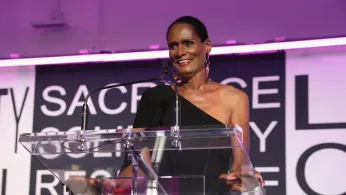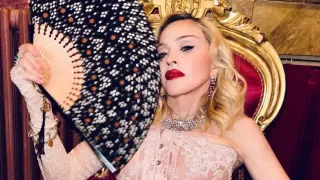
4 hours ago
Trailblazer Tracey Africa Norman Returns to the Runway
READ TIME: 3 MIN.
Tracey Africa Norman, a groundbreaking figure in both fashion and LGBTQ+ history, has returned to the runway in a moment that reverberates far beyond the world of haute couture. Norman, whose trailblazing career began in the 1970s, walked in the highly anticipated Luar show at New York Fashion Week, drawing widespread acclaim from both the fashion industry and the broader LGBTQ+ community.
Norman’s return comes decades after her unprecedented early success, when she became the first Black transgender woman to achieve mainstream modeling fame, appearing on the cover of international magazines and on Clairol hair color boxes—a feat that would be remarkable even today. Her recent runway appearance is not only a celebration of personal resilience, but also a milestone for transgender visibility at one of the world’s most influential fashion events.
Tracey Africa Norman’s story began in Newark, New Jersey, where she grew up before entering the New York fashion scene in the 1970s. Her modeling career took off almost by chance when she walked into a casting for the European designer Basile, which led to her being photographed by legendary photographer Irving Penn for Italian Vogue.
Norman was quickly signed by the prestigious Zoli modeling agency and booked for clients such as Patrick Kelly, Avon, Clairol, and Ultra Sheen. She graced the pages of Essence, Vogue Italia, and Harper’s Bazaar India, achieving a level of visibility that was unheard of for transgender women of color at the time.
However, her career came to an abrupt halt when her transgender identity was publicly revealed—a disclosure that led to her being ostracized by the industry for many years. Norman later reflected on this period, remarking that she never set out to be a role model, but came to recognize the significance of her achievements in advancing visibility for transgender people of color.
Norman’s impact extends far beyond her modeling. She became a beacon of possibility for countless transgender people, inspiring a new generation of models and entertainers, including well-known figures such as Laverne Cox, Janet Mock, and Pose star Angelica Ross. Her life story was featured in New York Magazine, and she has been credited as a direct inspiration for the character Angel Evangelista in FX’s acclaimed series Pose.
Pose, which explores the intersecting lives of LGBTQ+ people and the ballroom community in 1980s and 1990s New York, has been praised for its authentic representation of transgender women of color. In interviews, the show’s creators and cast have acknowledged Norman’s legacy, with Angel’s storyline drawing on Norman’s real-life experiences of navigating the fashion world as a transgender woman.
Norman’s recent runway appearance signals a new era for both her career and the broader movement for transgender inclusion in fashion. Her participation in the Luar show was met with enthusiastic applause, with many in the audience recognizing the profound significance of her return. The moment was widely covered by LGBTQ+ media outlets and celebrated on social media, with advocates highlighting Norman’s enduring influence and the progress that her story represents.
In recent years, Norman has spoken openly about her journey, including the challenges she faced after being outed and her determination to live authentically. She has also worked as a makeup artist, fashion stylist, and mentor to younger models, further cementing her status as a role model and advocate for LGBTQ+ rights and representation.
Norman’s story is a reminder of the resilience and artistry of transgender people, particularly Black transgender women, whose contributions to culture and fashion have often been erased or overlooked. Her presence on the runway at New York Fashion Week is not only a personal triumph, but also a collective moment of recognition and affirmation for the entire LGBTQ+ community.
As the fashion industry grapples with calls for greater diversity and inclusion, Norman’s return is a testament to the importance of honoring those who paved the way. Her legacy continues to inspire both established and emerging talents, and her advocacy underscores the ongoing need for visibility, opportunity, and respect for transgender people in all spheres of public life.
Norman herself has expressed gratitude for the recognition she has received in recent years, noting that she never anticipated the impact her story would have. In her own words, “All I ever really wanted was to live a quiet and respectful life, I never realized that at some point I’d be considered a role model. However, in reflecting over my past achievements, I realize just how significant my past work was, highlighting the fact that I was the first trans woman to have successfully worked in the fashion industry as a model, then to have been a Black woman at that”.
The applause that greeted Tracey Africa Norman’s return to the runway was more than a celebration of fashion—it was an acknowledgment of history, courage, and the transformative power of visibility.






